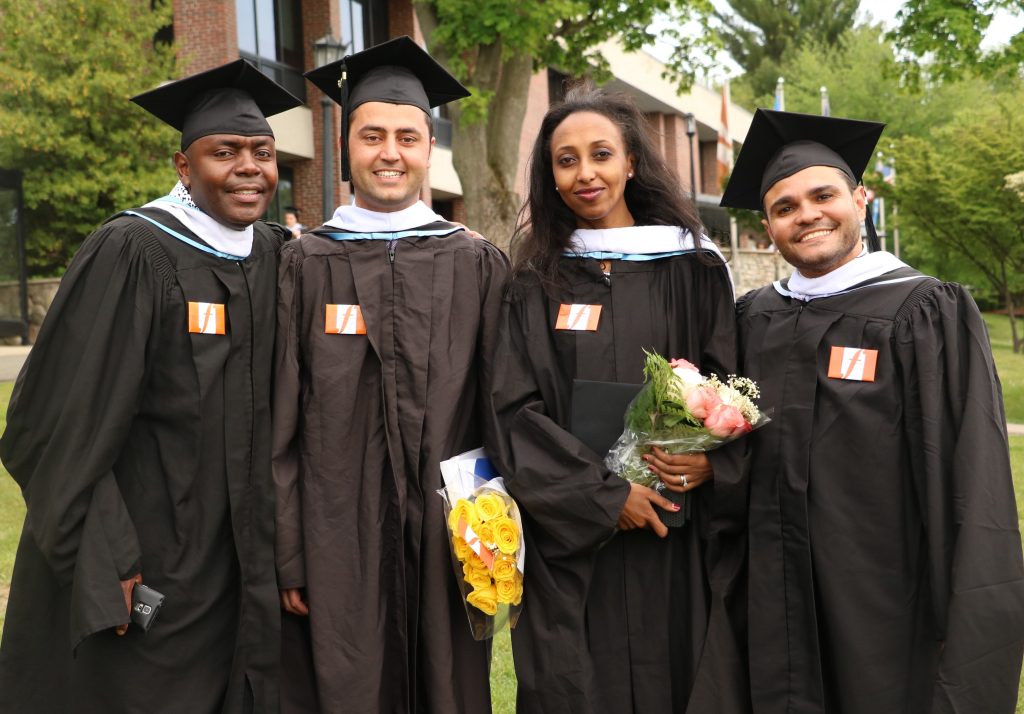The Feinstein International Center and Tufts University offer students and practitioners a variety of opportunities to develop skills, knowledge, and practical experience in humanitarian assistance and related fields. Our faculty teach at The Fletcher School at Tufts University and the Friedman School of Nutrition Science and Policy. We are actively involved in mentoring and supporting the academic and field work of students and practitioners.
[su_accordion] [su_spoiler title=”Degree Programs”]
Tufts University offers four graduate degrees or concentrations in humanitarian studies: the MS in Food and Nutrition Policy Programs (humanitarian assistance concentration); the Masters of Arts in Humanitarian Assistance (MAHA); the MA in Law and Diplomacy (Humanitarian field); and the Center’s faculty also supervise PhD students at Tufts and other Universities.
Food and Nutrition Policy Programs (FANPP)

FANPP is offered by the Friedman School. Students pursue a two-year M.S. through a multidisciplinary curriculum in nutrition science, statistics, economics, and food policy. Graduates of the program possess the skills and knowledge necessary to make an impact on food and nutrition programs and policies in the United States and around the world.

Master of Arts in Humanitarian Assistance (MAHA) 
MAHA is a joint-degree program, offered by the Friedman and Fletcher Schools. It is geared towards mid-career professionals who have significant field experience in humanitarian assistance. Students develop the knowledge and skills needed to advance their careers in the areas of nutrition, food policy, and economic, political and social development.


Master of Arts in Law and Diplomacy (MALD)

MALD is offered by The Fletcher School. A flexible, multidisciplinary curriculum allows students to choose from 22 fields of study within three divisions: International Law and Organizations; Diplomacy, History and Politics; and Economics and International Business. Graduates of the program possess the knowledge, skills, tools, and preparation needed to excel in a highly competitive global economy.

PhD Programs

Read More about Fletcher’s PhD Read More about Friedman’s PhD
Our faculty supervise students in the PhD programs at Fletcher and Friedman Schools. We also supervise students in non-Tufts programs.


[/su_spoiler]
[su_accordion] [su_spoiler title=”Humanitarian Education Courses at Tufts”]
Below are the core humanitarian courses at Tufts. Some of these are cross-listed between schools; some are specific to a given school. Some courses listed meet requirements for specific degree programs and others are part of broader fields of study that are directly applicable to humanitarian studies, which may be used as electives. Please consult your degree(s)-specific requirements and prerequisites before enrolling in any of these courses.
[/su_spoiler]
[su_accordion] [su_spoiler title=”Feinstein Summer Grants Program – suspended in 2021 due to Covid-19″]
APPLY FOR A SUMMER RESEARCH GRANT
The Feinstein International Center annual summer grants program is designed to stimulate applied research in issues pertaining to complex emergencies, humanitarian assistance, refugees and other migrants, natural disasters, and food security. The grants are intended to support travel and living expenses. Funds cannot be used to cover salary, overhead, indirect costs, or the purchase of equipment. Grants are up to $3,000 for overseas positions and up to $2,000 for US-based positions.
The program is open to all students at Tufts University who have either a summer internship with an organization focused on humanitarian action, or an agreement to be hosted with such an organization while carrying out the research project. In either case, a confirming email from the organization should accompany the application.
We will not be offering summer grants in 2021 due to travel restrictions related to Covid-19. Please check back in early 2022.
[/su_spoiler]
[su_accordion]
[su_spoiler title=”Ways for Students and Alumni to Get Involved”]
Groups for students and alumni
For anyone interested in Humanitarian Action:
- Humanitarian Professionals LinkedIn Group: Whether you’re on assignment in Darfur or DRC, Sri Lanka or OCHA HQ, coordinating emergency relief operations, advocacy to governments, or backstopping an NGO or UN technical unit, this group should help you connect with others engaged in humanitarian response. Click here to request approval from the moderator to join.
For Current Tufts Students:
- Humanitarian Action Society (HAS): works to engage the Fletcher and Friedman communities in issues surrounding humanitarian crises, responses, and work in the field. The goal is to foster interest in and understanding of humanitarian action and to promote interdisciplinary collaboration. Events include, skills building workshops, guest speaker events, events coordinated with the MAHA program, cross-school mixers (with similar clubs at Harvard and MIT). To get involved, join the HAS Trunk page by logging into Trunk, clicking on “Membership,” then “Joinable Sites,” search for “Humanitarian Action Society,” and click join.
For Tufts Alumni:
- MAHA Alumni Group: To keep individuals who have completed the MAHA program connected. Please click here to request to join the group on LinkedIn.
Useful listservs and other resources
- The Field Exchange is a technical publication on nutrition in emergencies that provides a platform to capture and rapidly “exchange” humanitarian programming experiences. On the site you will find research, evaluations, news, and technical views. They are often looking for articles. Check their website to gather information and/or learn how to submit an article.
- InsideNGO is a global association of over 300 international relief and development organizations who share operational expertise, insights, and leading practices to better sustain organizations and support essential missions in a changing world. Sign up for their emails to get regular updates skill development opportunities.
- Devex is a membership organization that aggregates news, jobs, business intelligence, and funding opportunities for international development professionals. You can sign up for their newsletter here.
[/su_spoiler]
[su_accordion] [su_spoiler title=”Non-Degree Programs for Practitioners”]
Practitioner in Residence Program
Recognizing the dynamic nature of relief work, the high turnover of staff, and the need for reflection and learning, we offer returning field workers the opportunity join the Center for four to twelve weeks. Practitioners in residence work with a faculty adviser to design an appropriate course of study.
Read More
[/su_spoiler]

